If you’re considering moving to Dubai or elsewhere in the United Arab Emirates (UAE) as an expat, this guide “Living in Dubai UAE – Ultimate Expat Guide” is just what you need. It’s packed with essential information to help you get to grips with life in this lively and diverse area. We’ll walk you through everything important for a hassle-free move. You’ll learn about managing living costs, getting healthcare, understanding visa rules, and finding the best places to live. With this guide in hand, you’re all set to join Dubai’s dynamic expat community.
Exploring the Charms of Dubai and the United Arab Emirates
Dubai is one of the seven emirates of the United Arab Emirates. It’s known for its stunning skyline, luxurious lifestyle, and thriving expat community. The UAE, in general, is a popular destination for ex-pats from all over the world. But what is it like to live in Dubai and the UAE as an expat? Let’s find out.
- Cultural Diversity: Dubai and the UAE, in general, are melting pots of cultures from around the world. As an expat, you’ll find yourself immersed in a multicultural environment where people of various nationalities coexist harmoniously. This diversity brings an array of traditions, languages, and cuisines to your doorstep, creating a rich tapestry of experiences.
- Tax-Free Income: One of the most appealing aspects for expats is the absence of income tax. This financial benefit allows you to maximize your earnings and plan for a secure financial future.
- Thriving Job Market: Dubai’s booming economy means you have access to a wide range of job opportunities across industries. The city’s status as a global business hub ensures a dynamic job market that caters to professionals from diverse backgrounds.
- Luxurious Lifestyle: Dubai is synonymous with luxury, and as an expat, you can savour the opulent lifestyle it offers. From high-end shopping districts to lavish dining establishments and entertainment venues, Dubai presents a world of indulgence.
- Safety and Security: Dubai is renowned for its low crime rate and strict law enforcement. This creates a safe environment for residents and their families, contributing to a sense of security and peace of mind.
- Family-Friendly: Dubai is exceptionally family-friendly, with an abundance of parks, recreational activities, and educational institutions. International schools provide top-quality education, ensuring a bright future for expat children.
- Efficient Infrastructure: The UAE’s commitment to modernity is evident in its state-of-the-art infrastructure. The city is well-connected with efficient public transport systems, making commuting hassle-free.
- Quality Healthcare: Dubai boasts world-class healthcare facilities, offering cutting-edge medical services. Comprehensive health insurance options ensure that you and your loved ones are well-covered in case of medical emergencies.
- Cultural Experiences: Beyond the skyscrapers, Dubai and the UAE offer a deep appreciation for culture and heritage. You can explore historic sites, visit museums, and participate in cultural events to gain insights into the region’s rich history.
- Global Travel Hub: The UAE’s strategic location makes it a convenient travel hub for exploring neighbouring countries and continents. You can easily jet off to diverse destinations across Asia, Europe, and Africa.
Living in Dubai and the UAE as an expat is not just about the luxuries but also the opportunity to grow personally and professionally in a welcoming and vibrant environment. It’s a place where you can build a fulfilling life, embrace different cultures, and create lasting memories.
Understanding Visa and Residency Options for Living In Dubai, UAE
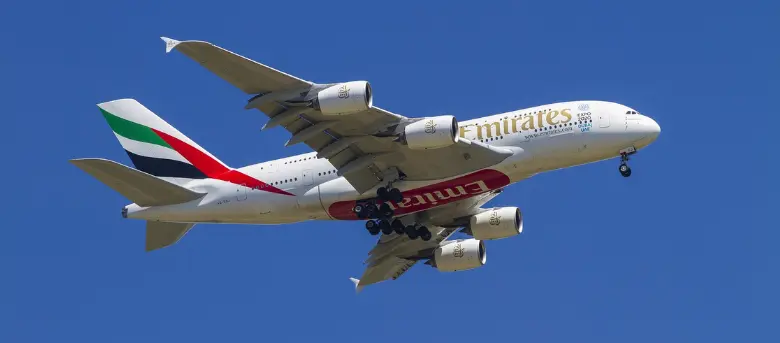
Acquiring a residence visa in the United Arab Emirates (UAE) is essential for expatriates looking to live and work in the country. The process involves several steps and can vary slightly depending on your specific circumstances. Here, we’ll guide you through the process of obtaining a residence visa in the UAE, including the different types of visas available:
Types of Visas in the UAE
- Employment Visa: A standard work visa is sponsored by an employer, making it necessary for those seeking employment in the UAE. It is usually the first step for expats planning to live and work in the country.
- Investor Visa (Golden Visa): The UAE Golden Visa is a long-term visa designed to attract investors and entrepreneurs. It can be obtained by individuals who make substantial investments in the UAE, such as property investment, establishing a business, or contributing to specific sectors like technology and healthcare.
- Family Visa: If employed in the UAE, you can sponsor your immediate family members, such as your spouse and children, for a family residence visa. This allows them to live with you in the UAE.
- Visit Visa: This is a temporary visa for individuals visiting family or friends in the UAE.
- Domestic Helper Visa: Employers in the UAE can sponsor domestic helpers such as housemaids, drivers, and nannies on this type of visa.
- Retirement Visa: Some emirates in the UAE offer retirement visas for individuals who meet certain age and financial requirements. It’s an attractive option for retirees looking to enjoy their golden years in the UAE.
- Student Visa: Students enrolled in accredited educational institutions in the UAE can obtain a student visa. This visa is usually sponsored by the educational institution.
- Green Visa: The “Green Visa” is a new visa category introduced to attract highly skilled professionals, entrepreneurs, and investors to the UAE. It offers a path to long-term residency and is part of the UAE’s efforts to enhance its attractiveness to global talent.
Obtaining the UAE residence visa is a straightforward process, often facilitated by employers for expats moving for work. It’s essential to understand the requirements and timelines to ensure a smooth transition.
Demystifying the Cost of Living in Dubai: An Expat’s Guide to UAE Expenses
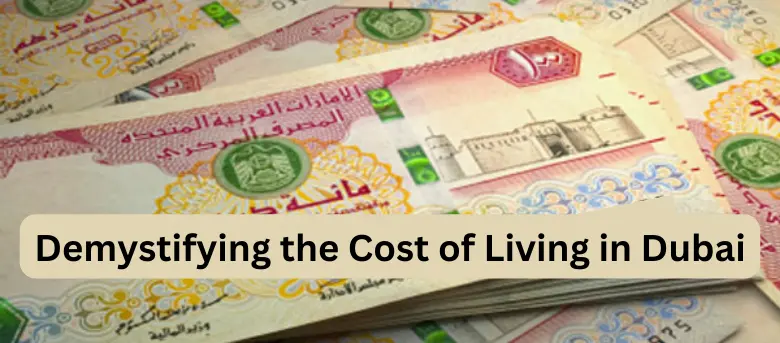
While Dubai offers a luxurious lifestyle and high quality of life, it comes with a price tag. Understanding the cost of living in Dubai is crucial for ex-pats planning to move to the UAE. The city is known for its high living expenses, particularly in areas such as accommodation, schooling, and leisure activities. However, the absence of income tax in the UAE is a significant financial relief, which, when coupled with careful financial planning, can make living in the UAE a rewarding experience.
Best Places To Live and Rent Ranges for Accommodation in the UAE
Accommodation is one of the most substantial expenses for expats in Dubai. The city offers a variety of housing options, ranging from high-rise apartments in areas like Dubai Marina and Jumeirah Beach Residence to luxurious villas in gated communities such as Emirates Hills and Arabian Ranches. The cost can vary significantly based on the property’s location, size, and amenities.
Many expats opt for leasing, and rents are usually paid annually or in quarterly cheques, which requires upfront financial planning. Engaging with a reputable real estate agency can provide insights into the market and help in finding a place that fits one’s budget and lifestyle preferences. Here’s a deeper look into the accommodation costs and resources for finding a place to live in Dubai:
Rent Ranges in Dubai
High-rise apartments: In sought-after areas like Dubai Marina or Jumeirah Beach Residence, rents for a one-bedroom apartment can range from AED 70,000 to AED 130,000 annually. For larger two-bedroom apartments, prices can go up to AED 160,000 or more per year.
Luxurious villas: For those preferring a more spacious and private living space, villas in areas like Emirates Hills or Arabian Ranches can range significantly in price. A standard three-bedroom villa can cost between AED 150,000 to AED 300,000 annually, depending on the exact location, size, and facilities provided.
Jumeirah Village Circle (JVC): A family-friendly development, JVC offers both apartments and townhouses. Rent for a one-bedroom apartment can range from AED 40,000 to AED 60,000 annually. For a two-bedroom apartment, rents are typically between AED 60,000 to AED 85,000 per year.
Al Barsha: Known for its spacious apartments and proximity to various malls and the Dubai Metro, Al Barsha offers a one-bedroom apartment for around AED 45,000 to AED 70,000 per year, while two-bedroom apartments can range from AED 70,000 to AED 100,000 annually.
Discovery Gardens: This area is known for its thematic gardens and spacious apartment layouts. A one-bedroom apartment in Discovery Gardens can cost between AED 40,000 to AED 50,000 per year, and a two-bedroom apartment can range from AED 65,000 to AED 75,000 annually.
Dubai Silicon Oasis (DSO): DSO is a technology park that provides a community lifestyle with a mix of residential and commercial amenities. The rent for a one-bedroom apartment ranges from AED 40,000 to AED 55,000 per year, and for a two-bedroom, it’s around AED 70,000 to AED 80,000 annually.
Dubai Sports City: Catering to sports enthusiasts with its range of sports facilities, apartments here offer good value. A one-bedroom apartment might cost between AED 38,000 to AED 55,000 per year, while a two-bedroom apartment can range from AED 65,000 to AED 80,000 annually.
Valuable Resources for Accommodation Hunt In Dubai As An Expat
Several online platforms can be instrumental in your search for the perfect home in Dubai. They offer comprehensive listings, with filters for location, price, and type of property, making it easier to find something that meets your needs and budget. Here are some reputable websites:
Bayut (www.bayut.com): Bayut is widely used in Dubai and provides a vast range of rental options. The site is user-friendly and includes detailed property descriptions, photos, and area guides.
Property Finder (www.propertyfinder.ae): Another popular choice, Property Finder offers an extensive database of properties for rent and sale. The platform provides useful tools like price trends and area comparisons.
Dubizzle (www.dubizzle.com): Dubizzle is an online classifieds website where landlords and real estate agents list properties. It’s particularly useful for direct landlord listings, potentially saving on agent fees.
Betterhomes (www.bhomes.com): Known for its professional service, Betterhomes offers a wide range of listings and assists experienced real estate agents.
Schooling In The UAE
For the majority of expat families, education is a primary concern and a significant part of the budget. Dubai boasts a wide array of international schools offering various curriculums, including British, American, and IB. These institutions provide high-quality education, but the fees can be substantial. Additionally, there may be extra costs for uniforms, extracurricular activities, and school trips.
Planning for these expenses is crucial, and some ex-pats negotiate education allowances as part of their employment packages. For more information on this section please visit our blog “Best International Schools in Dubai UAE for expat families“
Lifestyle and Leisure Expenses
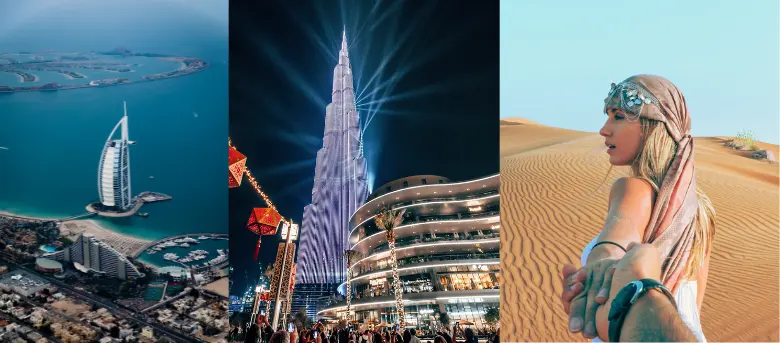
In Dubai, the luxury lifestyle and leisure options are as varied as they are exciting, ranging from high-end luxury experiences to more affordable recreational activities. Dubai is also designed to cater to a broad spectrum of interests and budgets. Here’s a glimpse into some of the costs associated with living the Dubai lifestyle:
Shopping in Dubai
Malls: Dubai is a shopper’s paradise. The Dubai Mall and Mall of the Emirates are more than just shopping destinations; they are entertainment complexes. While window shopping is free, purchasing branded items can be quite expensive. For example, a designer outfit can cost anywhere from AED 500 to several thousand AED.
Traditional Souks: For a more cultural and wallet-friendly shopping experience, the Gold Souk and Spice Souk offer a variety of items. Here, you can buy souvenirs, spices, or even gold at comparatively reasonable prices, but remember, bargaining is key!
Dining
Fine Dining Restaurants: A meal at a high-end restaurant can cost between AED 300 to AED 500 per person, excluding drinks.
Casual Dining: More casual dining spots and international chain restaurants are more affordable, with meals ranging from AED 50 to AED 150 per person.
Food Courts in Malls: For budget-friendly options, food courts in malls offer a variety of cuisines, typically costing around AED 25 to AED 50 per meal.
Entertainment and Leisure Activities
Cinema Tickets: A standard movie ticket costs around AED 35 to AED 50, while a VIP cinema experience can go up to AED 150.
Desert Safari: A popular activity for residents and tourists alike, prices for a desert safari can range from AED 150 to AED 400 per person, depending on the package and company chosen.
Skydiving: For adrenaline junkies, skydiving over the Palm Jumeirah is an unforgettable experience, but it comes with a price tag of around AED 2,000 to AED 2,500 for a tandem jump.
Beaches: While many beaches in Dubai are free, some of the more exclusive beach clubs charge an entry fee that can range from AED 100 to AED 200, which often includes a food and beverage credit.
Fitness and Wellness
Gym Memberships: Prices vary widely depending on the facilities and location, ranging from AED 200 to AED 1,500 per month.
Spa Treatments: A typical massage or spa treatment can cost between AED 300 to AED 600, depending on the spa’s luxury level.
Cultural Activities
Museums and Cultural Sites: Entry fees are relatively modest, with tickets often ranging from AED 10 to AED 100.
Art Galleries and Exhibitions: Many galleries offer free entry, making it a cost-effective way to soak in the local art scene.
While Dubai is synonymous with luxury and extravagance, the city also offers a multitude of experiences that cater to more modest budgets. Public parks, beaches, and walking trails are free or have minimal charges, and community events or markets often have free entry. By mixing high-end activities with more affordable experiences, expats can enjoy the best of Dubai without necessarily indulging in its most expensive offerings.
Transportation
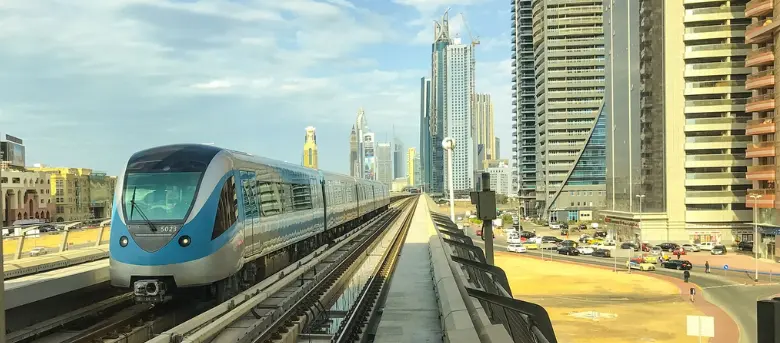
Transportation for expats and tourists in Dubai is well-organized, offering various options ranging from public transport to private vehicle ownership. Each mode of transportation comes with its own set of costs and considerations:
Extensive Public Transport system
Metro: The Dubai Metro is a popular and efficient way to get around the city. Fares depend on the number of zones crossed, ranging from AED 3.00 for a short trip within the same zone to AED 7.50 for a longer trip crossing multiple zones when using the standard class (Silver Nol card).
Buses: Dubai’s extensive bus network covers most areas of the city. Bus fares are similar to the Metro and are charged based on the number of zones crossed, starting at AED 3.00.
Taxis: Taxis in Dubai are relatively affordable and widely available. The base fare starts at AED 12.00, with a charge of around AED 1.82 per kilometre thereafter.
Private Transportation
Many expatriates find the convenience of owning a car to be essential, especially considering the local weather conditions.
Car Ownership Costs to consider include:
Purchase Price: Depending on the make and model, a new car can cost anywhere from AED 40,000 for a basic model to over AED 300,000 for a luxury vehicle.
Fuel: Fuel prices in Dubai are lower compared to many other countries, costing around AED 2.80 per litre.
Insurance: Car insurance is mandatory. The cost depends on the car’s value, driver’s age, and driving history, typically ranging from 2.75% to 5% of the car’s value per annum.
Maintenance: Regular maintenance costs vary depending on the vehicle type and usage but budgeting around AED 1,000 to AED 4,000 annually for a standard vehicle is advisable.
Medical Insurance or Healthcare in the UAE
The cost of healthcare in the UAE can vary widely based on several factors, including the level of coverage, the insured individual’s age and health status, and the insurer. Below are approximate ranges for different types of medical insurance plans in Dubai. These figures are indicative and can fluctuate based on the specifics of each case:
Basic Health Insurance Plan (Essential Benefits Plan):
Cost: Approximately AED 550 – AED 700 per year.
Coverage: This is the most basic and affordable insurance plan, primarily designed for employees with lower salaries. It covers essential health services but may have limitations in terms of coverage caps and the network of healthcare providers.
Enhanced Insurance Plans:
Cost: Approximately AED 1,500 – AED 10,000 per year.
Coverage: These plans offer broader coverage, including a wider network of healthcare facilities and additional medical services such as specialist consultations, better facilities, and sometimes even international coverage. The cost can vary significantly based on the specifics of the plan and the insured individual’s profile.
Premium Insurance Plans:
Cost: Can exceed AED 10,000 per year, potentially going much higher.
Coverage: These plans provide the most comprehensive coverage, including access to top-tier hospitals and clinics, specialized treatments, and a wide array of medical services. They are designed for those who want the highest standard of healthcare coverage and are willing to pay a premium for it.
It’s essential to note that these are rough estimates. Factors such as pre-existing conditions, age, lifestyle, level of coverage, deductible options, and the insurance provider’s policies can significantly impact the final cost of the insurance premium.
Employer-Sponsored Insurance:
For expats with jobs in Dubai, medical insurance is provided by their employers as part of the expat employment package. The DHA mandates that employers offer at least a Basic Health Insurance Plan to their employees. Some employers may choose to provide enhanced coverage as an added benefit.
Private Medical Insurance:
Expats who desire a higher level of coverage or specific benefits not covered by their employer’s plan may opt for private medical insurance. While this means an additional expense, it provides greater flexibility and peace of mind, especially for those who require regular medical care or wish to have access to the best medical facilities and services.
Essential Utilities Services in the UAE: Estimated Costs and Key Information
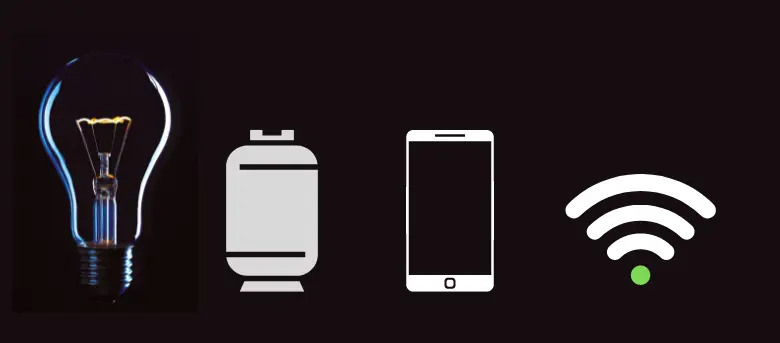
Electricity and Water:
Managed by local authorities like DEWA (Dubai) and ADWEA ( Abu Dhabi ).
Monthly costs for a small apartment typically range from AED 400-600, with potential increases during summer.
Bills can be paid and managed online, via apps, or at service centres.
Gas:
Used mainly for cooking, available in cylinders or piped in some areas.
The cost of gas varies based on usage and supply method, with cylinder refills typically costing around AED 100-200 each month, depending on size.
Emicool:
Emicool’s pricing structure typically involves a fixed monthly charge plus a variable fee based on consumption. While the exact costs can vary depending on the specific area, property size, and usage, an approximate range for a residential apartment might be:
Approximate Monthly expense: Around AED 300-1200.
Variable Consumption Fee: This can vary widely based on actual usage but expect to budget an additional few hundred dirhams for moderate usage.
Wi-Fi Internet Charges:
In the UAE, staying connected through Wi-Fi and mobile services is convenient, with several providers offering a range of plans to suit different needs
Providers: The primary providers are Etisalat and du, both offering a variety of home internet packages.
Costs:
- Basic Packages: Starting from around AED 250-300 per month for speeds of 12 Mbps to 20 Mbps.
- Mid-Range Packages: For speeds of around 100 Mbps, prices range from AED 350 to AED 500 per month.
- Premium Packages: For higher speeds (500 Mbps to 1 Gbps), costs can be AED 1000 or more per month.
Inclusions: Packages often include benefits like free calls, TV packages, and complimentary Wi-Fi routers.
Phone Cards (Prepaid and Postpaid):
Providers: The main telecom providers are Etisalat and du, offering both prepaid and postpaid options.
Prepaid Cards:
- Starting Cost: Basic prepaid starter packs can be as low as AED 25-50.
- Top-Up Options: Flexible top-up options are available based on usage, with data, call, and text packages that can be customized.
Postpaid Plans:
- Starting Plans: Basic postpaid plans start around AED 125-150 per month, offering a mix of data, calling minutes, and texts.
- Premium Plans: More comprehensive plans can go up to AED 500 or more per month, offering extensive data, international calling minutes, and other benefits.
The prices and package details can vary based on current promotions and specific user requirements. It’s always best to check the latest offers directly from the service providers’ official websites or by visiting their customer service centres.
Grocery in UAE
Grocery expenses in the UAE and Dubai can vary widely based on factors such as dietary preferences, shopping habits, and the choice between local and imported products. Here’s a general overview of the approximate monthly grocery expenses:
- Single Person: For basic groceries including essentials like bread, milk, eggs, fruits, vegetables, and meat, a single person might spend approximately AED 800 – AED 1,200 per month.
- Couple: A couple might spend around AED 1,500 – AED 2,500 per month on groceries, considering a balanced mix of local and some imported items.
- Family of Four: A family with two adults and two children might have a monthly grocery expense ranging from AED 3,000 to AED 4,500, depending on the consumption of fresh produce, meat, and any special dietary requirements.
These are approximate figures and actual expenses can be higher or lower based on individual lifestyle, the choice of supermarket or local market, and the frequency of dining out. Bulk buying, taking advantage of promotions, and choosing local brands over imported ones can help in managing and reducing grocery expenses.
Common Queries About Living in Dubai as an Expat:
How is life in Dubai for expats?
Dubai offers expats a dynamic lifestyle with high living standards and tax-free salaries. The city’s modern infrastructure, luxury amenities, and diverse culture blend with traditional Emirati elements. Arabic is the national language but English is widely spoken, facilitating easy communication. While the cost of living is high and summers are hot, the safe environment and the array of entertainment and lifestyle options make Dubai an attractive and convenient place for expatriates.
What is the average expat salary in Dubai?
The average expat salary in Dubai varies widely by profession and experience. Entry-level positions might offer AED 7,000 to AED 15,000 per month, while mid-level professionals can earn between AED 15,000 and AED 30,000. Senior executives and specialists may receive AED 30,000 to AED 100,000 or more. These figures can significantly increase with benefits like housing, health insurance, and schooling. Dubai’s tax-free environment further enhances the financial appeal for expatriates.
What salary do I need to live in Dubai?
For a comfortable lifestyle to stay in Dubai, a single person might need a salary ranging from AED 8,000 to AED 12,000 per month. A couple without children might require AED 12,000 to AED 16,000, covering rent, utilities, groceries, transportation, and leisure activities. These figures can vary based on lifestyle choices, housing preferences, and personal spending habits. Remember, Dubai’s tax-free income can significantly enhance purchasing power compared to other global cities.
Conclusion for Expat Guide to Live in the United Arab Emirates
- Dubai offers a unique blend of luxury, culture, and opportunity, making it a magnet for expats with exceptional quality of life.
- Navigating the visa process, understanding the cost of living, and securing the right accommodation are key steps.
- The job market is diverse, offering numerous opportunities, but securing employment before moving is crucial.
- The city’s healthcare and education systems are top-notch, offering peace of mind for you and your family.
- Understanding local laws and customs ensures a safe and enjoyable expat experience in Dubai.
Dubai isn’t just a place to live; it’s a place to thrive. With its blend of modernity and tradition, safety and adventure, work and leisure, it’s no wonder that expats from around the globe choose to call this dynamic city their home. Whether you’re sipping coffee by the Dubai Marina or navigating the bustling streets of downtown, every moment in Dubai is a step in an extraordinary journey.


